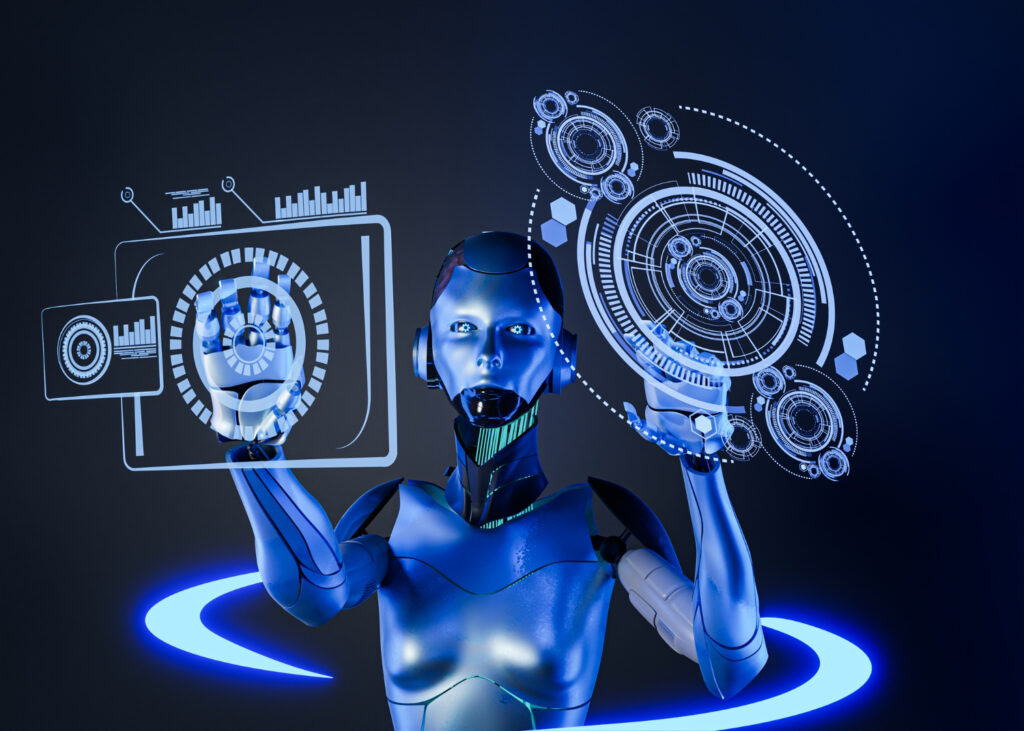Introduction to AI in Digital Marketing
What is Artificial Intelligence?
The ability of robots to simulate human intellectual functions, such as learning, reasoning, and self-correction, is known as artificial intelligence, or AI. Artificial Intelligence (AI) technologies include robots, computer vision, natural language processing (NLP), and machine learning. Artificial intelligence (AI) in digital marketing makes use of these tools to evaluate data, streamline processes, and provide individualized experiences that change the way companies interact with their customers.
How Digital Marketing is Being Transformed by AI
Digital marketing is being revolutionized by AI since it makes strategies more successful and efficient. It enables marketers to swiftly process enormous volumes of data, find insights that inform choices, and automate tedious operations. This change improves consumer experiences, enables more accurate targeting, and produces personalized content—all of which raise marketing return on investment.
AI’s advantages for digital marketing:
Improved Data Insights and Analysis
Artificial Intelligence surpasses humans in the analysis of massive datasets. Artificial Intelligence (AI) may provide marketers with profound insights into consumer behavior, preferences, and future purchasing intentions by leveraging machine learning algorithms to find patterns, trends, and correlations within data. Making well-informed decisions and developing more successful marketing strategies are made easier by these insights.
Improved Client Experience
Artificial intelligence (AI)-driven solutions, including chatbots and virtual assistants, improve customer service by giving prompt, tailored answers to inquiries. These resources are accessible around-the-clock, guaranteeing that clients will get assistance when they need it. AI may also customize a user’s experience on a website based on their previous usage, which results in a more fulfilling and engaging encounter.
Personalization at Scale
Marketers may now offer tailored content and suggestions at scale thanks to AI. AI is able to divide viewers into groups and tailor marketing messages to each group by examining user data. This degree of customization strengthens client relationships, boosts engagement, and enhances conversion rates.
Efficiency and Automation
AI streamlines time-consuming, repetitive processes like data entry, social media posting, and email marketing. Automation lowers the possibility of human error while simultaneously saving time. Because of their efficiency, marketers are able to concentrate on more important tasks like developing innovative campaigns and managing consumer relationships.

Essential Artificial Intelligence Tools for Digital Marketing
Machine Learning
Machine learning, a subset of AI, involves teaching algorithms to understand and anticipate patterns in data. Machine learning can be applied to customer segmentation, tailored suggestions, and predictive analytics in digital marketing. It enables more focused and successful marketing initiatives by assisting in the understanding of consumer behavior and the forecasting of future trends.
Natural Language Processing (NLP)
NLP makes it possible for machines to decipher and comprehend human language. NLP is the engine behind voice search, chatbots, and content analysis in digital marketing. Through text and voice conversations, it enables marketers to engage with customers more naturally and comprehend their needs. Additionally, sentiment analysis, which measures how the public feels about a product or brand, benefits from NLP.
Chatbots and Virtual Assistants
Chatbots and virtual assistants powered by AI offer immediate client support and interaction. They are capable of managing a variety of duties, such as assisting customers with the purchasing process and responding to commonly requested inquiries. By responding promptly and accurately, these technologies increase customer satisfaction while freeing up human workers to tackle more complicated requests.
Predictive Analytics
AI is used in predictive analytics to examine past data and forecast future results. It can predict consumer behavior, maximize ad expenditure, and pinpoint high-quality leads in digital marketing. Marketers may more efficiently manage resources and create plans that anticipate the requirements and preferences of their target audience with the use of predictive analytics.

AI Applications in Digital Marketing Strategies
Content Generation and Curation
AI tools are able to compose articles, come up with ideas for new content, and select pertinent stuff for viewers. AI, for instance, might provide ideas for blog posts by analyzing popular subjects and phrases. It can also write email subject lines, social media messages, and product descriptions. Moreover, consumers can receive tailored content recommendations from AI-powered content curation tools according to their interests.
Search Engine Optimization (SEO)
AI improves SEO efforts through the analysis of user behavior and search engine algorithms. AI solutions can monitor website performance, optimize on-page features, and conduct keyword research. In addition, they can forecast which keywords will do well and offer suggestions for improving content to raise search engine ranks. Websites may maintain their visibility and competitiveness in search results by using AI-driven SEO.
PPC (Pay Per Click) Advertising
AI analyzes data, modifies bids in real time, and optimizes PPC ads. It can determine which keywords generate the most traffic, which advertising are doing the best, and how to allocate budget to achieve the highest return on investment. By producing headlines and material that appeal to specific audiences, AI also aids in the design of advertisements. This degree of optimization and automation guarantees the success and affordability of PPC advertising.
Social Media Marketing
Artificial intelligence (AI) technologies for social media marketing track engagement, measure campaign effectiveness, and comprehend audience behavior by analyzing social media data. In addition, they have the ability to discover influencers for brand partnerships, reply to messages and comments, and automate publishing schedules. Marketers may produce social media content that is more engaging and forge closer bonds with their audience by utilizing AI.
Case Studies: AI Success Stories in Digital Marketing
AI-Driven Campaigns from Leading Brands
Major companies have attained impressive outcomes by effectively incorporating artificial intelligence into their digital marketing tactics. Coca-Cola, for instance, analyzes social media data using AI to come up with original content ideas. Through listening to consumers, Coca-Cola can develop more interesting and relevant advertising. Similar to this, Netflix enhances user satisfaction and retention by using AI algorithms to recommend content to consumers based on their viewing history.
Instances of AI Boosting ROI
For many businesses, AI has greatly increased return on investment. Global beauty store Sephora has deployed chatbots driven by artificial intelligence to provide clients customized beauty recommendations. This raised sales in addition to enhancing consumer interaction. Similar to this, Starbucks personalized marketing offers and messages using predictive analytics, which boosts expenditure per customer and increases customer retention.
Challenges and Considerations
Data Privacy and Ethical Concerns
Concerns about data privacy are among the ethical issues brought up by the use of AI in digital marketing. Marketers need to be careful to gather and handle consumer data in an ethical and open manner. Keeping customers’ trust requires putting strong data protection safeguards in place and adhering to laws like the GDPR.
The Role of Human Monitoring
Although AI is capable of automating a lot of activities, human monitoring is still necessary to guarantee that AI systems operate appropriately and morally. Marketers need to keep a close eye on AI outputs to make sure they are accurate and pertinent. Creating methods that emotionally connect with audiences also need human creativity and intuition.
Integration with Existing Systems
AI integration with current marketing platforms can be difficult. Technical understanding and a thorough comprehension of how AI tools integrate into the larger marketing plan are prerequisites. To guarantee seamless integration and optimize the advantages of AI, businesses need to invest in infrastructure and training.
Future Trends in AI and Digital Marketing
The Rise of Voice Search
AI is essential to the growing popularity of voice search, which is becoming more and more common. Marketers should concentrate on using natural language and long-tail keywords when optimizing their content for voice search. Businesses must modify their SEO strategy because AI-powered voice assistants, such as Google Assistant and Amazon’s Alexa, have changed the way customers conduct information searches
AI-Powered Video Marketing
AI is making video marketing even more effective. It’s a great tool. AI is capable of analyzing viewer behavior to optimize video content and suggest the ideal publishing windows. Additionally, it can automate the procedures of creating and editing videos, which would make it simpler for marketers to create excellent video content. Video marketing tactics can be more precisely targeted thanks to the insights that AI-driven video analytics provide about viewer engagement and preferences.
Advanced Personalization Techniques
Artificial Intelligence (AI) elevates personalization, a major trend in digital marketing. AI has the capacity to evaluate enormous volumes of data and provide highly customized experiences for every user. This includes targeted email advertising, tailored product recommendations, and unique online experiences. Sophisticated customisation strategies raise conversion rates and enhance client happiness.
Conclusion
Artificial Intelligence (AI) is revolutionizing the field of digital marketing by providing hitherto unseen chances for effectiveness, customization, and data-driven judgment. Businesses may improve customer experiences, boost marketing initiatives, and increase return on investment by utilizing AI technologies. To optimize the advantages of AI, it is imperative to tackle ethical considerations, guarantee human supervision, and provide resources towards the requisite infrastructure.
Frequently Asked Questions (FAQs)
How can AI be used by small firms for digital marketing?
AI can be used by small businesses to handle duties like email marketing, customer service, and social media management at a lower cost by utilizing AI-powered technologies. Without needing a significant investment, these solutions assist small firms in automating monotonous processes, analyzing data, and personalizing consumer interactions.
What are the expenses associated with using AI in marketing?
Depending on the complexity of the AI solutions and the extent of implementation, there are different expenses associated with using AI in marketing. While larger firms may choose to invest in unique AI solutions, smaller businesses can begin with more affordable technologies. When assessing the costs associated with using AI, it is crucial to take the long-term ROI into account.
What effects will AI have on digital marketing in the coming future?
Digital marketing will continue to innovate thanks to AI, which will make it more efficient, individualized, and data-driven. Advanced predictive analytics, voice search optimization, and chatbots with AI capabilities will all be used more frequently in the future. With the advancement of AI technology, marketers will be able to develop even more captivating and successful marketing campaigns.

